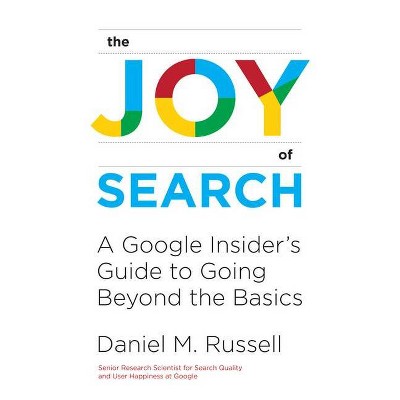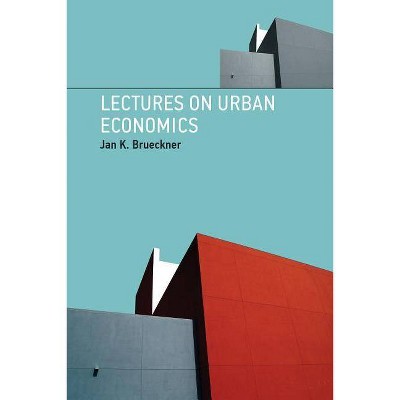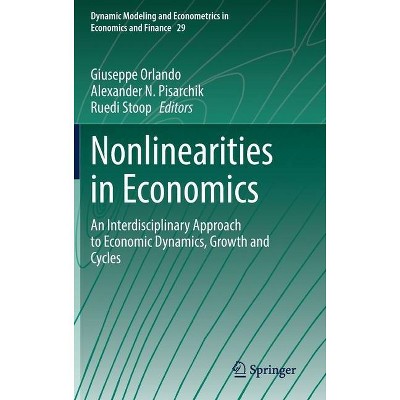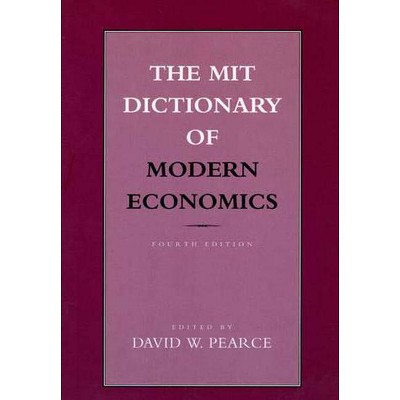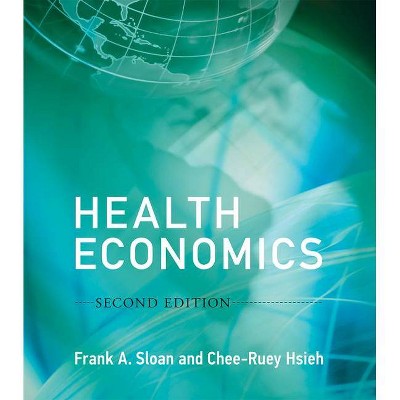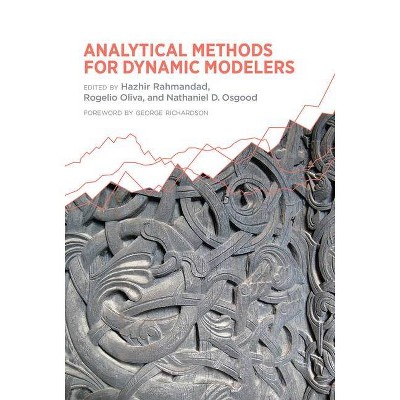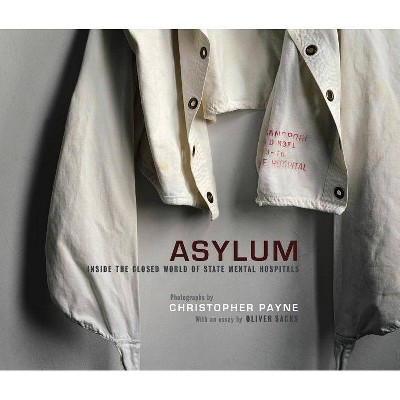Dynamic Economics - (Mit Press) by Jerome Adda & Russell W Cooper (Hardcover)
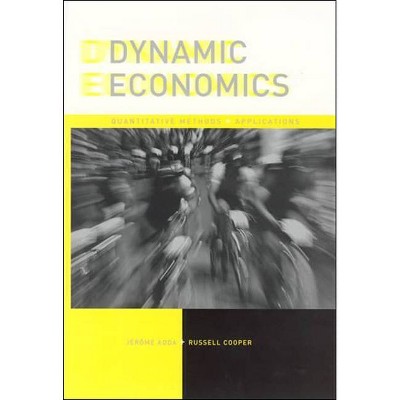
Similar Products
Products of same category from the store
AllProduct info
<p/><br></br><p><b> About the Book </b></p></br></br>An integrated approach to the empirical application of dynamic optimization programming models, for students and researchers.<p/><br></br><p><b> Book Synopsis </b></p></br></br><b>An integrated approach to the empirical application of dynamic optimization programming models, for students and researchers. </b><p>This book is an effective, concise text for students and researchers that combines the tools of dynamic programming with numerical techniques and simulation-based econometric methods. Doing so, it bridges the traditional gap between theoretical and empirical research and offers an integrated framework for studying applied problems in macroeconomics and microeconomics.</p><p>In part I the authors first review the formal theory of dynamic optimization; they then present the numerical tools and econometric techniques necessary to evaluate the theoretical models. In language accessible to a reader with a limited background in econometrics, they explain most of the methods used in applied dynamic research today, from the estimation of probability in a coin flip to a complicated nonlinear stochastic structural model. These econometric techniques provide the final link between the dynamic programming problem and data. Part II is devoted to the application of dynamic programming to specific areas of applied economics, including the study of business cycles, consumption, and investment behavior. In each instance the authors present the specific optimization problem as a dynamic programming problem, characterize the optimal policy functions, estimate the parameters, and use models for policy evaluation.</p><p>The original contribution of <i>Dynamic Economics: Quantitative Methods and Applications</i> lies in the integrated approach to the empirical application of dynamic optimization programming models. This integration shows that empirical applications actually complement the underlying theory of optimization, while dynamic programming problems provide needed structure for estimation and policy evaluation.</p><p/><br></br><p><b> Review Quotes </b></p></br></br><br>""Dynamic Economics" is the sort of book I wish I had written. It provides a very accessible and interesting introduction to the literature on economic models based on dynamic programming methods that have been developed in the last several decades. Unlike other recent work in this area, Adda and Cooper's book discusses econometric methods for estimating the unknown parameters of these models as well as summarizing some of the most promising computational methods for solving them. The book provides a range of interesting examples and is written at a level that is accessible for people who are new to the subject, but it also contains many deep ideas that will be appreciated by people who spend their careers researching in this area. I learned a lot from this book and recommend it as a text for graduate classes (possibly even advanced undergraduate classes) on dynamic economic methods."--John Rust, Professor of Economics, University of Maryland<br><br>"This book is a welcome addition to the macroeconomics literature. It is both a very effective textbook and a welcome summary of developments and tools needed to do state-of-the-art research in the very dynamic, changing field."--Paul D. McNelis, Professor of Economics, Georgetown University<br><br>"This is an excellent text in applied dynamic macroeconomics for teachers, students, and researchers. It enables the research community to learn how to use dynamic economic theory to interpret economic data and quantify the theoretical implications. Any applied economist should have this book on his or her shelf as a quick guide for the available options of 'how to do it.'"--Zvi Eckstein, Tel Aviv University, University of Minnesota, and Centre for Economic Policy Research<br><br>"<br><br>" Dynamic Economics is the sort of book I wish I had written. It provides a very accessible and interesting introduction to the literature on economic models based on dynamic programming methods that have been developed in the last several decades. Unlike other recent work in this area, Adda and Cooper's book discusses econometric methods for estimating the unknown parameters of these models as well as summarizing some of the most promising computational methods for solving them. The book provides a range of interesting examples and is written at a level that is accessible for people who are new to the subject, but it also contains many deep ideas that will be appreciated by people who spend their careers researching in this area. I learned a lot from this book and recommend it as a text for graduate classes (possibly even advanced undergraduate classes) on dynamic economic methods." --John Rust, Professor of Economics, University of Maryland<br><br>" This book is a welcome addition to the macroeconomics literature. It is both a very effective textbook and a welcome summary of developments and tools needed to do state-of-the-art research in the very dynamic, changing field." --Paul D. McNelis, Professor of Economics, Georgetown University<br><br>" This is an excellent text in applied dynamic macroeconomics for teachers, students, and researchers. It enables the research community to learn how to use dynamic economic theory to interpret economic data and quantify the theoretical implications. Any applied economist should have this book on his or her shelf as a quick guide for the available options of 'how to do it.'" --Zvi Eckstein, Tel Aviv University, University of Minnesota, and Centre for Economic Policy Research<br><br>" "Dynamic Economics" is the sort of book I wish I had written. It provides a very accessible and interesting introduction to the literature on economic models based on dynamic programming methods that have been developed in the last several decades. Unlike other recent work in this area, Adda and Cooper's book discusses econometric methods for estimating the unknown parameters of these models as well as summarizing some of the most promising computational methods for solving them. The book provides a range of interesting examples and is written at a level that is accessible for people who are new to the subject, but it also contains many deep ideas that will be appreciated by people who spend their careers researching in this area. I learned a lot from this book and recommend it as a text for graduate classes (possibly even advanced undergraduate classes) on dynamic economic methods." --John Rust, Professor of Economics, University of Maryland<br><br>" This book is a welcome addition to the macroeconomics literature. It is both a very effective textbook and a welcome summary of developments and tools needed to do state-of-the-art research in the very dynamic, changing field." --Paul D. McNelis, Professor of Economics, Georgetown University<br><br>" This is an excellent text in applied dynamic macroeconomics for teachers, students, and researchers. It enables the research community to learn how to use dynamic economic theory to interpret economic data and quantify the theoretical implications. Any applied economist should have this book on his or her shelf as a quick guide for the available options of 'how to do it.'" --Zvi Eckstein, Tel Aviv University, University of Minnesota, and Centre for Economic Policy Research<br><br>--John Rust, Professor of Economics, University of Maryland<br><br>--Paul D. McNelis, Professor of Economics, Georgetown University<br><br>--Zvi Eckstein, Tel Aviv University, University of Minnesota, and Centre for Economic Policy Research<br><p/><br></br><p><b> About the Author </b></p></br></br>Jérôme Adda is a Lecturer in the Department of Economics at University College, London, and a Research Associate at the Institute of Fiscal Studies. <p/>Russell Cooper is Professor in the Department of Economics at the University of Texas, Austin. He was formerly affiliated with Boston University and was a Visiting Scholar in the Research Department of the Federal Reserve Bank of Minneapolis.
Price History
Price Archive shows prices from various stores, lets you see history and find the cheapest. There is no actual sale on the website. For all support, inquiry and suggestion messagescommunication@pricearchive.us

